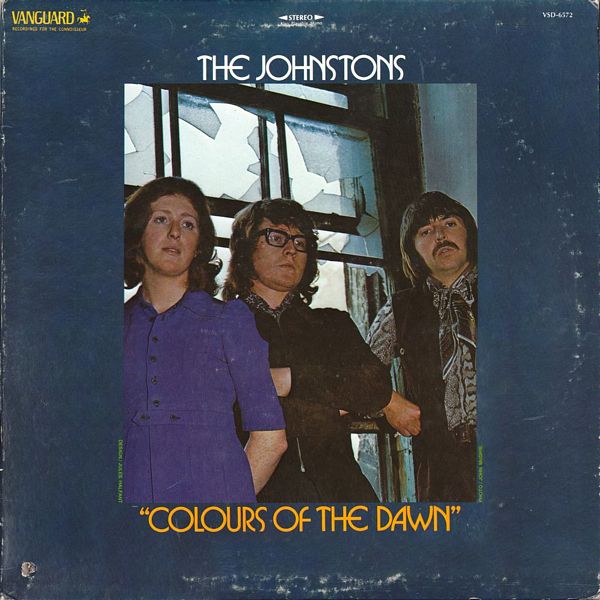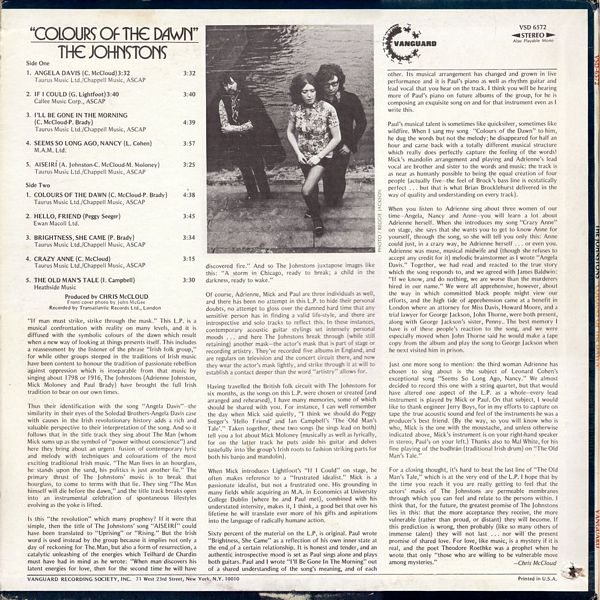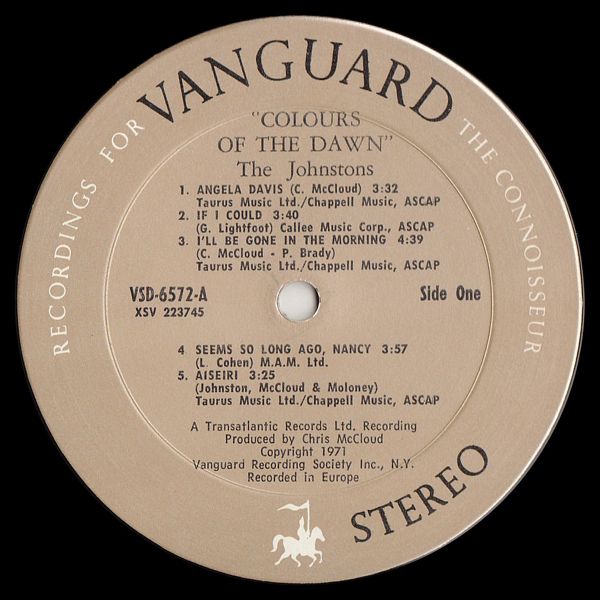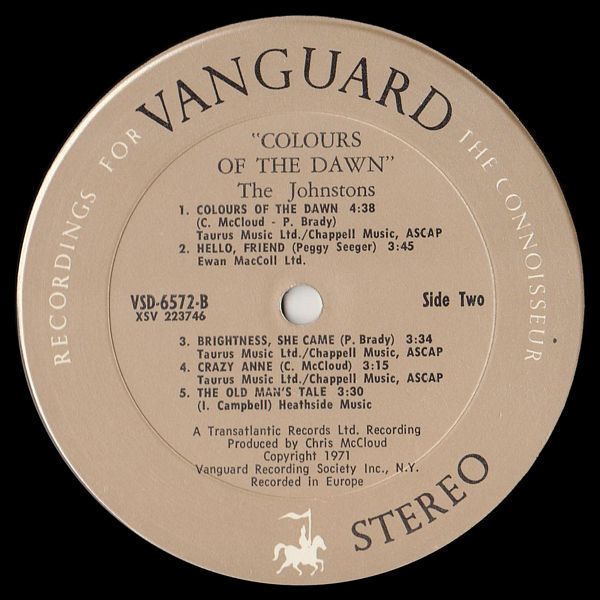

 |


 |
Sleeve Notes
"If man must strike, strike through the mask." This L.P. is a musical confrontation with reality on many levels, and it is diffused with the symbolic colours of the dawn which result when a new way of looking at things presents itself. This includes a reassessment by the listener of the phrase "Irish folk group," for while other groups steeped in the traditions of Irish music have been content to honour the tradition of passionate rebellion against oppression which is inseparable from that music by singing about 1798 or 1916, The Johnstons (Adrienne Johnston, Mick Moloney and Paul Brady) have brought the full Irish tradition to bear on our own times.
Thus their identification with the song "Angela Davis" — the similarity in their eyes of the Soledad Brothers — Angela Davis case with causes in the Irish revolutionary history adds a rich and valuable perspective to their interpretation of the song. And so it follows that in the title track they sing about The Man (whom Mick sums up as the symbol of "power without conscience") and here they bring about an urgent fusion of contemporary lyric and melody with techniques and colourations of the most exciting traditional Irish music. "The Man lives in an hourglass, he stands upon the sand, his politics is just another lie." The primary thrust of The Johnstons' music is to break that hourglass, to come to terms with that lie. They sing "The Man himself will die before the dawn," and the title track breaks open into an instrumental celebration of spontaneous lifestyles evolving as the yoke is lifted.
Is this "the revolution" which many prophesy? If it were that simple, then the title of The Johnstons' song "AISEIRí" could have been translated to "Uprising" or "Rising." But the Irish word is used instead by the group because it implies not only a day of reckoning for The Man, but also a form of resurrection, a catalytic unleashing of the energies which Teilhard de Chardin must have had in mind as he wrote: "When man discovers his latent energies for love, then for the second time he will have discovered fire.". And so The Johnstons juxtapose images like this: "A storm in Chicago, ready to break; a child in the darkness, ready to wake."
Of course; Adrienne, Mick and Paul are three individuals as well, and there has been no attempt in this LP to hide their personal doubts, no attempt to gloss over the damned hard time that any sensitive person has in finding a valid life-style, and there are introspective and solo tracks to reflect this. In these instances, contemporary acoustic guitar stylings set intensely personal moods … and here The Johnstons break through (while still retaining) another mask — the actor's mask that is part of stage or recording artistry. They've recorded five albums in England, and are regulars on television and the concert circuit there, and now they wear the actor's mask lightly, and strike through it at will to establish a contact deeper than the word "artistry" allows for.
Having travelled the British folk circuit with The Johnstons for six months, as the songs on this L.P. were chosen or created (and arranged and rehearsed), I have many memories, some of which should be shared with you. For instance, I can well remember the day when Mick said quietly, "I think we should do Peggy Seeger's 'Hello Friend' and Ian Campbell's 'The Old Man's Tale'." Taken together, these two songs (he sings lead on both) tell you a lot about Mick Moloney (musically as well as lyrically, for on the latter track he puts aside his guitar and delves tastefully into the group's Irish roots to fashion striking parts for both his banjo and mandolin).
When Mick introduces Lightfoot's "If I Could" on stage, he often makes reference to a "frustrated idealist." Mick is a passionate idealist, but not a frustrated one. His grounding in many fields while acquiring an M.A. in Economics at University College Dublin (where he and Paul met), combined with his understated intensity, makes it, I think, a good bet that over his lifetime he will translate ever more of his gifts and aspirations into the language of radically humane action.
Sixty percent of the material on the L.P. is original. Paul wrote "Brightness, She Came" as a reflection of his own inner state at the end of a certain relationship. It is honest and tender, and an authentic introspective mood is set as Paul sings alone and plays both guitars. Paul and I wrote "I'll Be Gone In The Morning" out of a shared understanding of the song's meaning, and of each other. Its musical arrangement has changed and grown in live performance and it is Paul's piano as well as rhythm guitar and lead vocal that you hear on the track. I think you will be hearing more of Paul's piano on future albums of the group, for he is composing an exquisite song on and for that instrument even as I write this.
Paul's musical talent is sometimes like quicksilver, sometimes like wildfire. When I sang my song "Colours of the Dawn" to him, he dug the words but not the melody; he disappeared for half an hour and came back with a totally different musical structure which really does perfectly capture the feeling of the words! Mick's mandolin arrangement and playing and Adrienne's lead vocal are brother and sister to the words and music: the track is as near as humanly possible to being the equal creation of four people (actually five — the feel of Brock's bass line is ecstatically perfect … but that is what Brian Brocklehurst delivered in the way of quality and understanding on every track).
When you listen to Adrienne sing about three women of our time — Angela, Nancy and Anne — you will learn a lot about Adrienne herself. When she introduces my song "Crazy Anne" on stage, she says that she wants you to get to know Anne for yourself, through the song, so she will tell you only this: Anne could just, in a crazy way, be Adrienne herself … or even you. Adrienne was muse, musical midwife and (though she refuses to accept any credit for it) melodic brainstormer as I wrote "Angela Davis." Together, we had read and reacted to the true story which the song responds to, and we agreed with James Baldwin:
"If we know, and do nothing, we are worse than the murderers hired in our name." We were all apprehensive, however, about the way in which committedblack people might view our efforts, and the high tide of apprehension came at a benefit in London where an attorney for Miss Davis, Howard Moore, and a trial lawyer for George Jackson, John Thorne, were both present, along with George Jackson's sister, Penny … The best memory I have is of these people's reaction to the song, and we were especially moved when John Thorne said he would make a tape copy from the album and play the song to George Jackson when he next visited him in prison.
Just one more song to mention: the third woman Adrienne has chosen to sing about is the subject of Leonard Cohen's exceptional song "Seems So Long Ago, Nancy." We almost decided to record this one with a string quartet, but that would have altered one aspect of the L.P. as a whole — every lead instrument is played by Mick or Paul. On that subject, I would like to thank engineer Jerry Boys, for in my efforts to capture on tape the true acoustic sound and feel of the instruments he was a producer's best friend. (By the way, so you will know who is who, Mick is the one with the moustache, and unless otherwise indicated above, Mick's instrument is on your right-hand speaker in stereo; Paul's on your left.) Thanks also to Mal White, for his fine playing of the bodhrán (traditional Irish drum) on "The Old Man's Tale."
For a closing thought, it's hard to beat the last line of "The Old Man's Tale," which is at the very end of the L.P. I hope that by the time you reach it you are really getting to feel that the actors' masks of The Johnstons are permeable membranes through which you can feel and relate to the persons within. I think that, for the future, the greatest promise of The Johnstons lies in this: that the more acceptance they receive, the more vulnerable (rather than proud, or distant) they will become. If this prediction is wrong, then probably (like so many others of immense talent) they will not last … nor will the present promise of shared love. For love, like music, is a mystery if it is real, and the poet Theodore Roethke was a prophet when he wrote that only "those who are willing to be vulnerable move among mysteries."
— Chris McCloud